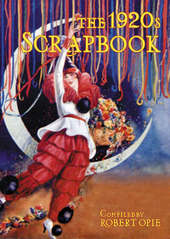
|
The 1920s Scrapbook
Hardback
Main Details
| Title |
The 1920s Scrapbook
|
| Authors and Contributors |
By (author) Robert Opie
|
| Physical Properties |
| Format:Hardback | | Pages:62 | | Dimensions(mm): Height 379,Width 267 |
|
| Category/Genre | British and Irish History |
|---|
| ISBN/Barcode |
9781872727943
|
| Classifications | Dewey:941.083 |
|---|
| Audience | |
|---|
| Illustrations |
colour illustrations
|
|
Publishing Details |
| Publisher |
New Cavendish Books
|
| Imprint |
New Cavendish Books
|
| Publication Date |
1 January 1999 |
| Publication Country |
United Kingdom
|
Description
With over 1000 colourful images, Robert Opie brings to life the 1920s and captures the mood of this radical decade. The 1920s were a time for change and invention. The arrival of the wireless provided a new form of entertainment and "The Radio Times" was launched in 1923. The popularity of the cinema continued and was changed forever with the coming of "talkies" and "The Jazz Singer" in 1926. While there were many notable events, from the Tutankhamen discoveries to the Empire exhibition at Wembley, unemployment and worker's discontent pervaded everyday life, culminating in the General strike of 1926. For children, however, fun and amusement could be found with new cartoon characters: the antics of Felix the Cat at the pictures, tales of Pooh Bear in Milne's book and, in newspapers, Bonzo the Dog (Daily Sketch), Rupert the Bear (Daily Express), Teddy Tail (Daily Mail) and Pip, Squeak and Wilfred (Daily Mirror). Apart from women daring to smoke, the young "flappers" found freedom in the rising hemlines that revealed their legs and enabled the new energetic dances such as the Charleston and Black Bottom. It was an experimental age for hairstyles, perming, criping, bobbing. No wonder then that this decade became known as the roaring twenties.
Author Biography
Since the 1970s, Robert Opie has amassed an unrivalled collection of packaging and paper materials which are now housed in his museum of packaging in Gloucester. He is the auhtor of numerous publications and has given many talks to schools, as well as on radio and TV.
|